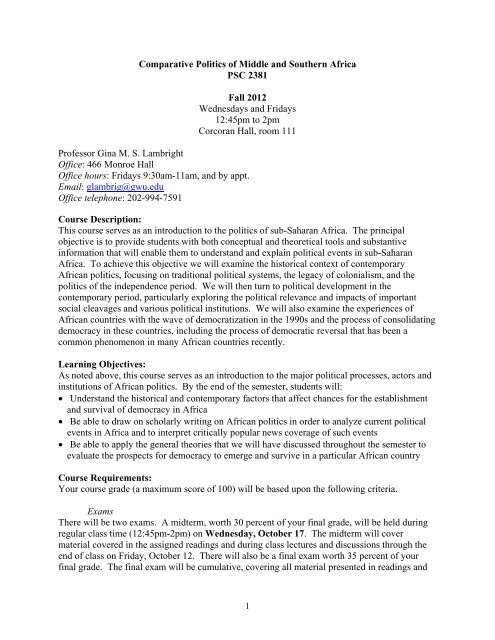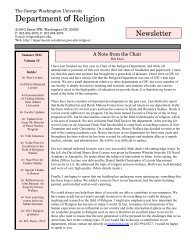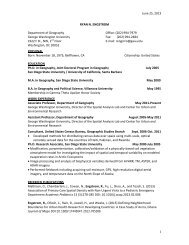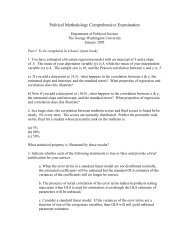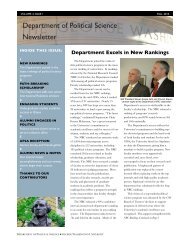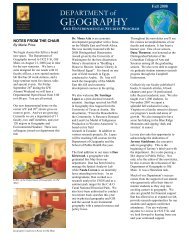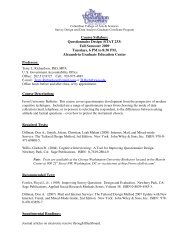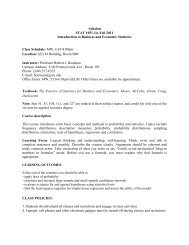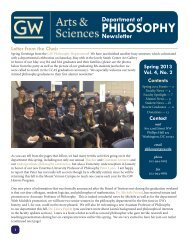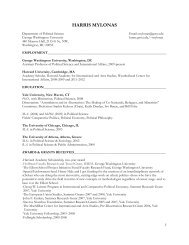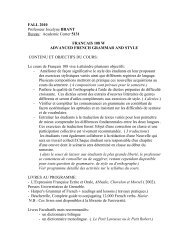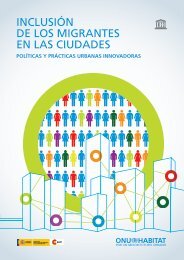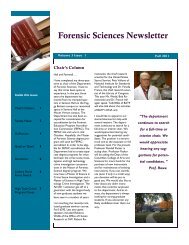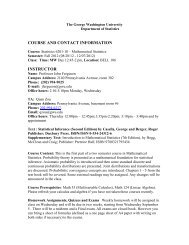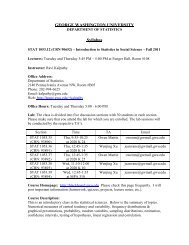Comparative Politics of Middle and Southern Africa PSC 2381 Fall ...
Comparative Politics of Middle and Southern Africa PSC 2381 Fall ...
Comparative Politics of Middle and Southern Africa PSC 2381 Fall ...
Create successful ePaper yourself
Turn your PDF publications into a flip-book with our unique Google optimized e-Paper software.
<strong>Comparative</strong> <strong>Politics</strong> <strong>of</strong> <strong>Middle</strong> <strong>and</strong> <strong>Southern</strong> <strong>Africa</strong><br />
<strong>PSC</strong> <strong>2381</strong><br />
<strong>Fall</strong> 2012<br />
Wednesdays <strong>and</strong> Fridays<br />
12:45pm to 2pm<br />
Corcoran Hall, room 111<br />
Pr<strong>of</strong>essor Gina M. S. Lambright<br />
Office: 466 Monroe Hall<br />
Office hours: Fridays 9:30am-11am, <strong>and</strong> by appt.<br />
Email: glambrig@gwu.edu<br />
Office telephone: 202-994-7591<br />
Course Description:<br />
This course serves as an introduction to the politics <strong>of</strong> sub-Saharan <strong>Africa</strong>. The principal<br />
objective is to provide students with both conceptual <strong>and</strong> theoretical tools <strong>and</strong> substantive<br />
information that will enable them to underst<strong>and</strong> <strong>and</strong> explain political events in sub-Saharan<br />
<strong>Africa</strong>. To achieve this objective we will examine the historical context <strong>of</strong> contemporary<br />
<strong>Africa</strong>n politics, focusing on traditional political systems, the legacy <strong>of</strong> colonialism, <strong>and</strong> the<br />
politics <strong>of</strong> the independence period. We will then turn to political development in the<br />
contemporary period, particularly exploring the political relevance <strong>and</strong> impacts <strong>of</strong> important<br />
social cleavages <strong>and</strong> various political institutions. We will also examine the experiences <strong>of</strong><br />
<strong>Africa</strong>n countries with the wave <strong>of</strong> democratization in the 1990s <strong>and</strong> the process <strong>of</strong> consolidating<br />
democracy in these countries, including the process <strong>of</strong> democratic reversal that has been a<br />
common phenomenon in many <strong>Africa</strong>n countries recently.<br />
Learning Objectives:<br />
As noted above, this course serves as an introduction to the major political processes, actors <strong>and</strong><br />
institutions <strong>of</strong> <strong>Africa</strong>n politics. By the end <strong>of</strong> the semester, students will:<br />
Underst<strong>and</strong> the historical <strong>and</strong> contemporary factors that affect chances for the establishment<br />
<strong>and</strong> survival <strong>of</strong> democracy in <strong>Africa</strong><br />
Be able to draw on scholarly writing on <strong>Africa</strong>n politics in order to analyze current political<br />
events in <strong>Africa</strong> <strong>and</strong> to interpret critically popular news coverage <strong>of</strong> such events<br />
Be able to apply the general theories that we will have discussed throughout the semester to<br />
evaluate the prospects for democracy to emerge <strong>and</strong> survive in a particular <strong>Africa</strong>n country<br />
Course Requirements:<br />
Your course grade (a maximum score <strong>of</strong> 100) will be based upon the following criteria.<br />
Exams<br />
There will be two exams. A midterm, worth 30 percent <strong>of</strong> your final grade, will be held during<br />
regular class time (12:45pm-2pm) on Wednesday, October 17. The midterm will cover<br />
material covered in the assigned readings <strong>and</strong> during class lectures <strong>and</strong> discussions through the<br />
end <strong>of</strong> class on Friday, October 12. There will also be a final exam worth 35 percent <strong>of</strong> your<br />
final grade. The final exam will be cumulative, covering all material presented in readings <strong>and</strong><br />
1
class lectures/discussion during the semester. The final will be held as scheduled in the final<br />
exam schedule (date to be announced later). Both exams may include a mix <strong>of</strong> short answer,<br />
multiple choice <strong>and</strong> essay questions.<br />
Map quiz<br />
There will be a map quiz in-class on Wednesday, September 19 at the beginning <strong>of</strong> class.<br />
Students who arrive after any student has already turned in the quiz will not be permitted to take<br />
the quiz. Please arrive on time (at least on September 19)! Make-up quizzes will not be given<br />
except in the case <strong>of</strong> medical complications or other extreme circumstances. Documentation <strong>of</strong><br />
illness or other circumstances is required. No make-up quiz will be given without proper<br />
documentation.<br />
Final paper<br />
In addition to the above, there is a required final paper. The final paper will be worth 25 percent<br />
<strong>of</strong> your final grade <strong>and</strong> is due by 5pm on Friday, December7. Papers will be graded on<br />
content, i.e. how well the paper fulfills the assignment <strong>and</strong> the overall quality <strong>of</strong> ideas <strong>and</strong><br />
analysis presented in the paper. The assignment will require that you incorporate course material<br />
into your analysis <strong>and</strong> your grade will be based on how well you incorporate the assigned course<br />
readings into your paper. Your grade will also be based on more technical aspects <strong>of</strong> writing<br />
(e.g. proper citation <strong>of</strong> sources, grammar, typographical errors, etc.) Please read the excerpt <strong>of</strong><br />
the university’s policy on Academic Honesty reproduced below.<br />
Midterm 30%<br />
Final exam 35%<br />
Map quiz 10%<br />
Final paper 25%<br />
Class Policies:<br />
Class meetings<br />
Students are expected to come to class prepared <strong>and</strong> ready to participate in class discussions.<br />
This requires that each student complete all <strong>of</strong> the assigned readings before every class. Students<br />
are expected to pay attention to lectures <strong>and</strong> discussions, <strong>and</strong> also to contribute to debate <strong>and</strong><br />
discussion in class. To facilitate the learning process for all <strong>of</strong> us, electronic devices (laptops,<br />
iPads, cell phones) cannot be used during class for anything other than notetaking. Texting,<br />
emailing, online chatting, tweeting, surfing the web, or other similar behavior are distracting to<br />
me <strong>and</strong> fellow students <strong>and</strong> will not be tolerated during class. The first time I see you engaging<br />
in such behavior I will politely ask you to stop. After that, I will ask you to leave class that day.<br />
To facilitate the lecture <strong>and</strong> discussion, I have posted discussion questions for each topic on<br />
Blackboard. Please review the discussion questions (<strong>and</strong> think about them) before class.<br />
Also, there is no m<strong>and</strong>atory attendance policy. I hope that you will attend regularly <strong>and</strong> look<br />
forward to your participation in class. As a reminder, the university encourages students who are<br />
ill or experiencing flu-like symptoms to stay at home. My lecture notes are not available, but I<br />
encourage each <strong>of</strong> you to seek out classmates early in the semester with whom you can share<br />
notes should any <strong>of</strong> you need to miss class.<br />
2
Make-up exams<br />
Make-up exams <strong>and</strong> quizzes will not be given except in the case <strong>of</strong> medical complications or<br />
other university approved excuses. Documentation is required.<br />
Late papers<br />
Late final papers will be accepted with a penalty. The penalty is as follows: Five points will be<br />
deducted for each day (or part <strong>of</strong> a day) that the paper is late. E.g. if you turn your paper in at<br />
7pm on December 7, five points will be deducted. Or if you turn your paper in after 5pm on<br />
December 8, ten points will be deducted. No papers will be accepted as email attachments.<br />
Academic Honesty<br />
All George Washington University policies regarding academic honesty will be strictly enforced.<br />
Plagiarism, cheating or academic misconduct in any manner will not be tolerated. All<br />
university procedures, as detailed in the Code <strong>of</strong> Academic Integrity, will be followed if there is<br />
any violation or suspected violation <strong>of</strong> the university’s academic honesty policy. Article III,<br />
Section 5 <strong>of</strong> the Code <strong>of</strong> Academic Integrity details appropriate sanctions for any violation <strong>of</strong> the<br />
university’s policy on academic honesty. It states:<br />
The recommended minimum sanction in first <strong>of</strong>fense cases shall be failure <strong>of</strong> the<br />
assignment in question. The recommended minimum sanction in repeat violation<br />
cases shall be failure <strong>of</strong> the course. For more serious <strong>of</strong>fenses sanction may be<br />
suspension from the University for a specified, minimum time or expulsion<br />
from the University. Other sanctions may be appropriate for particular cases.<br />
(See http://www.gwu.edu/~ntegrity/code.html#sanctions for more information. Emphasis added.)<br />
Please read, reread, <strong>and</strong> be sure you fully comprehend the following excerpt from the<br />
university’s Code <strong>of</strong> Academic Integrity:<br />
Section 1: Definition <strong>of</strong> Academic Dishonesty<br />
(a) Academic dishonesty is defined as cheating <strong>of</strong> any kind, including misrepresenting<br />
one's own work, taking credit for the work <strong>of</strong> others without crediting them <strong>and</strong> without<br />
appropriate authorization, <strong>and</strong> the fabrication <strong>of</strong> information.<br />
(b) Common examples <strong>of</strong> academically dishonest behavior include, but are not limited to,<br />
the following:<br />
1) Cheating - intentionally using or attempting to use unauthorized materials, information,<br />
or study aids in any academic exercise; copying from another student's examination;<br />
submitting work for an in-class examination that has been prepared in advance;<br />
representing material prepared by another as one's own work; submitting the same work in<br />
more than one course without prior permission <strong>of</strong> both instructors; violating rules governing<br />
administration <strong>of</strong> examinations; violating any rules relating to academic conduct <strong>of</strong> a course<br />
or program.<br />
2) Fabrication - intentional <strong>and</strong> unauthorized falsification or invention <strong>of</strong> any data,<br />
information, or citation in an academic exercise.<br />
3) Plagiarism - intentionally representing the words, ideas, or sequence <strong>of</strong> ideas <strong>of</strong><br />
another as one's own in any academic exercise; failure to attribute any <strong>of</strong> the<br />
following: quotations, paraphrases, or borrowed information.<br />
3
4) Falsification <strong>and</strong> forgery <strong>of</strong> University academic documents - knowingly making a<br />
false statement, concealing material information, or forging a University <strong>of</strong>ficial's signature<br />
on any University academic document or record. Such academic documents or records may<br />
include transcripts, add-drop forms, requests for advanced st<strong>and</strong>ing, requests to register for<br />
graduate-level courses, etc. (Falsification or forgery <strong>of</strong> non-academic University documents,<br />
such as financial aid forms, shall be considered a violation <strong>of</strong> the non-academic student<br />
disciplinary code.)<br />
5) Facilitating academic dishonesty - intentionally or knowingly helping or attempting to<br />
help another to commit an act <strong>of</strong> academic dishonesty.<br />
The above excerpt is from Article 1, Section 1 <strong>of</strong> the George Washington University’s Code <strong>of</strong><br />
Academic Integrity. (Emphasis added.) Please see the GW Office for Academic Integrity’s<br />
website (http://www.gwu.edu/~ntegrity/index.html) for additional information.<br />
I am available <strong>and</strong> willing to answer any questions about how to properly cite <strong>and</strong> give credit to<br />
sources used in completing the writing assignment. Also, please visit the Writing Center<br />
(http://www.gwu.edu/~gwriter/) for further assistance on citation or for general questions related<br />
to organizing <strong>and</strong> writing term papers. Claims <strong>of</strong> ignorance about how or when to properly cite<br />
sources is not an excuse for academic dishonesty. If you are unsure, ask.<br />
Students with Disabilities<br />
Students with any disability or special learning needs should contact me early in the semester<br />
<strong>and</strong> also contact Disabilities Support Services (Marvin Center, Suite 242; (202) 994-8250) so<br />
that appropriate accommodations can be made.<br />
Required Materials:<br />
There are three books required for this course. In addition, there are readings available<br />
electronically through Blackboard. The assigned readings are listed in the reading schedule<br />
below, however additional readings may be assigned throughout the semester <strong>and</strong> will be<br />
announced in class or via email. You are responsible for all <strong>of</strong> the assigned readings—those<br />
listed in the syllabus <strong>and</strong> those that may be announced during the semester. In addition to the<br />
scholarly book chapters <strong>and</strong> articles listed below, relevant newspaper articles <strong>and</strong> links to<br />
relevant websites may also posted on Blackboard for particular sections <strong>of</strong> the course.<br />
The required books are:<br />
<strong>Africa</strong>n <strong>Politics</strong> <strong>and</strong> Society: A Mosaic in Transformation, Second Edition. 2004. Peter J.<br />
Schraeder. Belmont, CA: Wadsworth. (Abbreviated as ASP below).<br />
Anthills <strong>of</strong> the Savannah. 1988. Chinua Achebe. New York: Anchor Books.<br />
States <strong>and</strong> Power in <strong>Africa</strong>. 2000. Jeffrey Herbst. Princeton: Princeton University Press.<br />
(Abbreviated as SPA below).<br />
As soon as possible, begin reading the novel, Anthills <strong>of</strong> the Savannah. We will discuss Anthills<br />
on Wednesday, October 31. You will be expected to have read completely <strong>and</strong> be ready to<br />
discuss the novel in class on October 31.<br />
4
**Please note: I reserve the right to change any readings, dates <strong>and</strong> requirements listed in<br />
this syllabus. You are responsible for any changes made <strong>and</strong> announced in class or via<br />
email.<br />
Reading Schedule<br />
Section 1: <strong>Africa</strong>n Political History: An Overview<br />
Course Introduction<br />
Wednesday, August 29<br />
Traditional Political Systems<br />
Friday, August 31<br />
Schraeder, <strong>Africa</strong>n <strong>Politics</strong> <strong>and</strong> Society (ASP), Chapters 1 <strong>and</strong> 2.<br />
Herbst, States <strong>and</strong> Power in <strong>Africa</strong>: <strong>Comparative</strong> Lessons in Authority <strong>and</strong> Control (SPA)<br />
Chapters 1 <strong>and</strong> 2.<br />
Colonialism in <strong>Africa</strong><br />
Wednesday, September 5<br />
Schraeder, ASP, Chapter 3<br />
Herbst, SPA, Chapter 3<br />
Hochschild, Adam. 1999. King Leopold’s Ghost. Boston: Mariner Books. Chapters 10 <strong>and</strong><br />
11. pp. 150-184.<br />
<strong>Africa</strong>n Nationalism <strong>and</strong> Political Independence<br />
Friday, September 7<br />
Schraeder, ASP, Chapter 4<br />
Boahen, Adu A. 1987. <strong>Africa</strong>n Perspectives on Colonialism. Baltimore, MD: The Johns<br />
Hopkins University Press. Chapters 3 <strong>and</strong> 4. pp. 58-112.<br />
Section 2: Sources <strong>of</strong> Political Conflict<br />
Ethnicity <strong>and</strong> Conflict<br />
Wednesday, September 12 <strong>and</strong> Friday, September 14<br />
Schraeder, ASP, Chapter 5<br />
Ndegwa, Stephen N. 1997. “Citizenship <strong>and</strong> Ethnicity: An Examination <strong>of</strong> Two Transition<br />
Moments in Kenyan <strong>Politics</strong>.” American Political Science Review. 91 (3) pp. 5899-616.<br />
Bates, Robert. 1986. “Modernization, Ethnic Competition, <strong>and</strong> the Rationality <strong>of</strong> <strong>Politics</strong> in<br />
Contemporary <strong>Africa</strong>”, in Marion Doro <strong>and</strong> Newell Stultz (eds.) Governing in Black <strong>Africa</strong>.<br />
New York: Holmes & Meier. pp. 153-67.<br />
Miguel, Edward. 2004. “Tribe or Nation? Nation Building <strong>and</strong> Public Goods in Kenya<br />
versus Tanzania. World <strong>Politics</strong>. 56 (3) pp. 327-362.<br />
Map Quiz<br />
Wednesday, September 19 (beginning <strong>of</strong> class)<br />
5
Case Study: Kenya<br />
Wednesday, September 19<br />
Anderson, David. 2005. Histories <strong>of</strong> the Hanged: The Dirty War in Kenya <strong>and</strong> the End <strong>of</strong><br />
Empire. New York: W.W. Norton. Chapter 1. pp. 9-53.<br />
Likimani, Muthoni. 1985. Passbook No. 47927: Women <strong>and</strong> Mau Mau in Kenya.<br />
Basingstoke: MacMillan. “Kariokor Location.” pp75-91.<br />
Friday, September 21<br />
Chege, Michael. 2008. “Kenya Back from the Brink.” Journal <strong>of</strong> Democracy. 19 (4) pp.<br />
125-139.<br />
Kanyinga, Karuti, <strong>and</strong> James D. Long. 2012. “The Political Economy <strong>of</strong> Reforms in Kenya.”<br />
<strong>Africa</strong>n Studies Review. 55 (1) pp. 31-51.<br />
Religion, Gender, Social Class <strong>and</strong> Other Identities<br />
Wednesday, September 26<br />
Tripp, Aili. 2003. “Women in Movement Transformations in <strong>Africa</strong>n Political L<strong>and</strong>scape.”<br />
International Feminist Journal <strong>of</strong> <strong>Politics</strong>. 5 (2) pp. 233-255.<br />
Tamale, Sylvia. 1999. When Hens Begin to Crow: Gender <strong>and</strong> Parliamentary <strong>Politics</strong> in<br />
Ug<strong>and</strong>a. Boulder, CO: Westview Press. Chapter 2. pp. 41-67.<br />
Gilman, Lisa. 2002. “Purchasing Praise: Women, Dancing <strong>and</strong> Patronage in Malawi Party<br />
<strong>Politics</strong>.” <strong>Africa</strong> Today. 48 (4) pp. 42-64.<br />
Friday, September 28<br />
Readings to be announced.<br />
Section 3: Institutions <strong>of</strong> <strong>Africa</strong>n <strong>Politics</strong><br />
The State<br />
Wednesday, October 3<br />
Schraeder, ASP, Chapter 8<br />
Herbst, SPA, Chapter 4<br />
Englebert, Pierre. 2000. “The Paradox <strong>of</strong> <strong>Africa</strong>n States.” in State Legitimacy <strong>and</strong><br />
Development in <strong>Africa</strong>. Boulder, CO: Lynne Rienner Publishers.<br />
Personal Rule<br />
Friday, October 5 <strong>and</strong> Wednesday, October 10<br />
Jackson, Robert H. <strong>and</strong> Carl G. Rosberg. 1984. “Personal Rule: Theory <strong>and</strong> Practice in<br />
<strong>Africa</strong>.” <strong>Comparative</strong> <strong>Politics</strong>. 16 (4) pp. 421-442.<br />
Orizio, Riccardo. 2002. “Jean-Bedel Bokassa.” in Talk <strong>of</strong> the Devil: Encounters with Seven<br />
Dictators. New York: Walker <strong>and</strong> Company. pp. 33-58.<br />
Mobutu: King <strong>of</strong> Zaire<br />
Friday, October 12<br />
Midterm Exam<br />
Wednesday, October 17<br />
6
Civil Society<br />
Friday, October 19<br />
Chabal, Patrick <strong>and</strong> Jean-Pascal Daloz. 1999. <strong>Africa</strong> Works: Disorder as Political<br />
Instrument. Oxford: James Curry. Chapter 2. pp. 17-30.<br />
LeVan, A. Carl. 2011. “Questioning Tocqueville in <strong>Africa</strong>: Continuity <strong>and</strong> Change in Civil<br />
Society during Nigeria’s Democratization.” Democratization. 18 (1) pp. 135-159.<br />
Obadare, Ebenezer. 2009. “The Uses <strong>of</strong> Ridicule: Humour, ‘Infrapolitics’, <strong>and</strong> Civil Society<br />
in Nigeria.” <strong>Africa</strong>n Affairs. 108 (431) pp. 241-261.<br />
Traditional Institutions Today<br />
Wednesday, October 24<br />
Herbst, SPA, Chapter 6<br />
Englebert, Pierre. 2002. “Born Again Bug<strong>and</strong>a or the Limits <strong>of</strong> Traditional Resurgence in<br />
<strong>Africa</strong>.” Journal <strong>of</strong> Modern <strong>Africa</strong>n Studies. 40 (3) pp. 345-368.<br />
Military Interventions<br />
Friday, October 26<br />
Schraeder, ASP, Chapter 9<br />
Decalo, Samuel. 1990. Coups <strong>and</strong> Army Rule in <strong>Africa</strong>: Motivations <strong>and</strong> Constraints. Second<br />
Edition. New Haven, CT: Yale University Press. Chapter 1. pp. 1-32.<br />
Forrest, Joshua B. 2005. “Democratization in a Divided Urban Political Culture: Guinea<br />
Bissau” The Fate <strong>of</strong> <strong>Africa</strong>’s Democratic Experiments. Leonardo A. Villalón <strong>and</strong> Peter<br />
VonDoepp (eds.) Bloomington, IN: Indiana University Press. pp. 246-266.<br />
Political Stability<br />
Wednesday, October 31<br />
Achebe, Chinua. Anthills <strong>of</strong> the Savannah. Entire book.<br />
Section 4: Elections <strong>and</strong> Democratization in <strong>Africa</strong><br />
Return <strong>of</strong> Electoral <strong>Politics</strong><br />
Friday, November 2<br />
Schraeder, ASP, Chapter 10<br />
Bratton, Michael <strong>and</strong> Nicolas van de Walle. 1997. Democratic Experiments in <strong>Africa</strong>.<br />
Cambridge: Cambridge University Press. Chapter Three. pp. 97-127.<br />
Posner, Daniel N. <strong>and</strong> Daniel J. Young. 2007. “The Institutionalization <strong>of</strong> Political Power in<br />
<strong>Africa</strong>.” Journal <strong>of</strong> Democracy. 18 (3) pp. 126-140.<br />
Semi-Authoritarianism<br />
Wednesday, November 7<br />
van de Walle, Nicolas. 2002. “<strong>Africa</strong>n’s Range <strong>of</strong> Regimes: Elections without Democracy.”<br />
Journal <strong>of</strong> Democracy. 13 (2) pp. 66-80.<br />
Lindberg, Staffan. 2003. “It’s Our Time to Chop: Do Elections in <strong>Africa</strong> Feed<br />
Neopatrimonialism rather than Counteract it?” Democratization. 10 (2) pp. 121-140.<br />
7
Lewis, Peter. 2008. “Growth without Prosperity in <strong>Africa</strong>.” Journal <strong>of</strong> Democracy. v.19, no.<br />
4, pp. 95-109.<br />
Consolidating Democracy<br />
Friday, November 9 <strong>and</strong> Wednesday, November 14<br />
Bratton, Michael, Robert Mattes, <strong>and</strong> E. Gyimah-Boadi. 2005. “Attitudes to Democracy,”<br />
Chapter Three in Public Opinion, Democracy, <strong>and</strong> Market Reform. Cambridge: Cambridge<br />
University Press. pp. 65-96.<br />
Bratton, Michael <strong>and</strong> Eric Chang. 2007. “State Building <strong>and</strong> Democratization in Sub-<br />
Saharan <strong>Africa</strong>: Forwards, Backwards, or Together?” <strong>Comparative</strong> Political Studies. 39 (9)<br />
pp. 1059-1083.<br />
Lindberg, Staffan. 2006. “The Surprising Significance <strong>of</strong> <strong>Africa</strong>n Elections.” Journal <strong>of</strong><br />
Democracy. 17 (1) pp. 40-151.<br />
Political Parties <strong>and</strong> Party Systems<br />
Friday, November 16<br />
van de Walle, Nicolas. 2003. “Presidentialism <strong>and</strong> clientelism in <strong>Africa</strong>’s emerging party<br />
systems.” Journal <strong>of</strong> Modern <strong>Africa</strong>n Studies. 41 (2) pp. 297-321.<br />
Cheeseman, Nic <strong>and</strong> Marja Hinfelaar. 2009. “Parties, Platforms, <strong>and</strong> Political Mobilization;<br />
the Zambian Presidential Election <strong>of</strong> 2008.” <strong>Africa</strong>n Affairs. 109 (434) pp. 51-76.<br />
Case Study: Nigeria<br />
Wednesday, November 28<br />
Obi, Cyril. 2011. “Taking Back our Democracy? The trails <strong>and</strong> travails <strong>of</strong> Nigerian elections<br />
since 1999.” Democratization. 18 (2) 366-387.<br />
Case Study: Ghana<br />
Friday, November 30<br />
Jockers, Heinz, Dirk Kohnert, <strong>and</strong> Paul Nugent. 2010. “The Successful Ghana Election <strong>of</strong><br />
2008: A Convenient Myth?” Journal <strong>of</strong> Modern <strong>Africa</strong>n Studies. 48 (1) pp. 95-115.<br />
Gyimah-Boadi, E. 2009. “Another Step Forward for Ghana.” Journal <strong>of</strong> Democracy. 20 (2)<br />
pp. 138-152.<br />
Case Study: Senegal<br />
Wednesday, December 5<br />
Mbow, Penda. 2008. “Senegal: the Return <strong>of</strong> Personalism.” Journal <strong>of</strong> Democracy. 19 (1) pp.<br />
156-169.<br />
Kelly, Catherine Lena. 2012. “Senegal: What will Turnover Bring?” Journal <strong>of</strong> Democracy.<br />
23 (3) pp. 121-131.<br />
Review for final exam<br />
Friday, December 7<br />
Final papers due<br />
Friday, December 7, 5pm<br />
8


